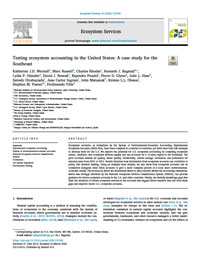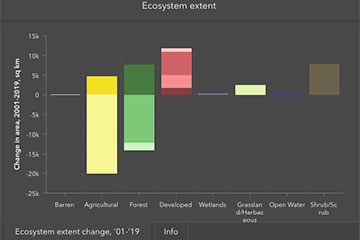Natural capital accounting is a method of assessing natural ecosystems’ contributions to the economy in order to help governments:
- Better understand their economies’ reliance upon natural systems,
- Track changes in natural systems that may have implications for industries, and
- Manage natural resources and ecosystems to ensure their economic benefits are sustained into the future.
A standard framework for natural capital accounting developed by the United Nations and partner organizations describes several categories of natural capital accounts. One of these, ecosystem accounts, tracks the extent and condition of ecosystem assets and the flows of ecosystem services they provide to people and the economy (for more background, see the National Ecosystem Services Partnership webinar on natural capital accounting).
Duke’s Nicholas Institute for Energy, Environment & Sustainability developed pilot ecosystem accounts for a ten-state region in the southeastern United States as part of a working group led by the U.S. Geological Survey (USGS) and comprising members from various federal agencies, nonprofits, academic institutions, and private corporations. The goal of this effort was to test the applicability of the account structure and terminology developed by the United Nations with data available for the United States. The pilot ecosystem accounts include metrics for recreational birding, air and water purification, wild pollination, biodiversity, and carbon storage, which were quantified using data from a variety of sources, including geospatial analyses developed by the Nicholas Institute to map ecosystem services.
These pilot ecosystem accounts provide examples of metrics related to the provision of biophysical ecological products; illustrate how the accounts can be used to track information about ecosystem condition, processes and services; and demonstrate the challenges of compiling relevant data for ecosystem accounting on a broad spatial scale. The original pilot accounts were released in 2020 and included data through 2011 for most metrics (and through 2015 for a few metrics). An update released in 2023 added data through 2019 for wild pollination and water purification, and through 2016 for recreational birding.
Testing Ecosystem Accounting in the United States: A Case Study for the Southeast
Data release
Dashboard to explore updated data
The Nicholas Institute’s work on this project is supported by The Department of the Interior Southeast Climate Adaptation Science Center, which is managed by the USGS National Climate Adaptation Science Center.









